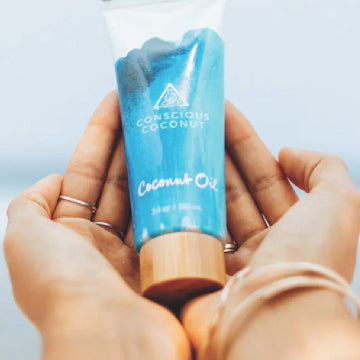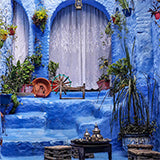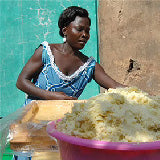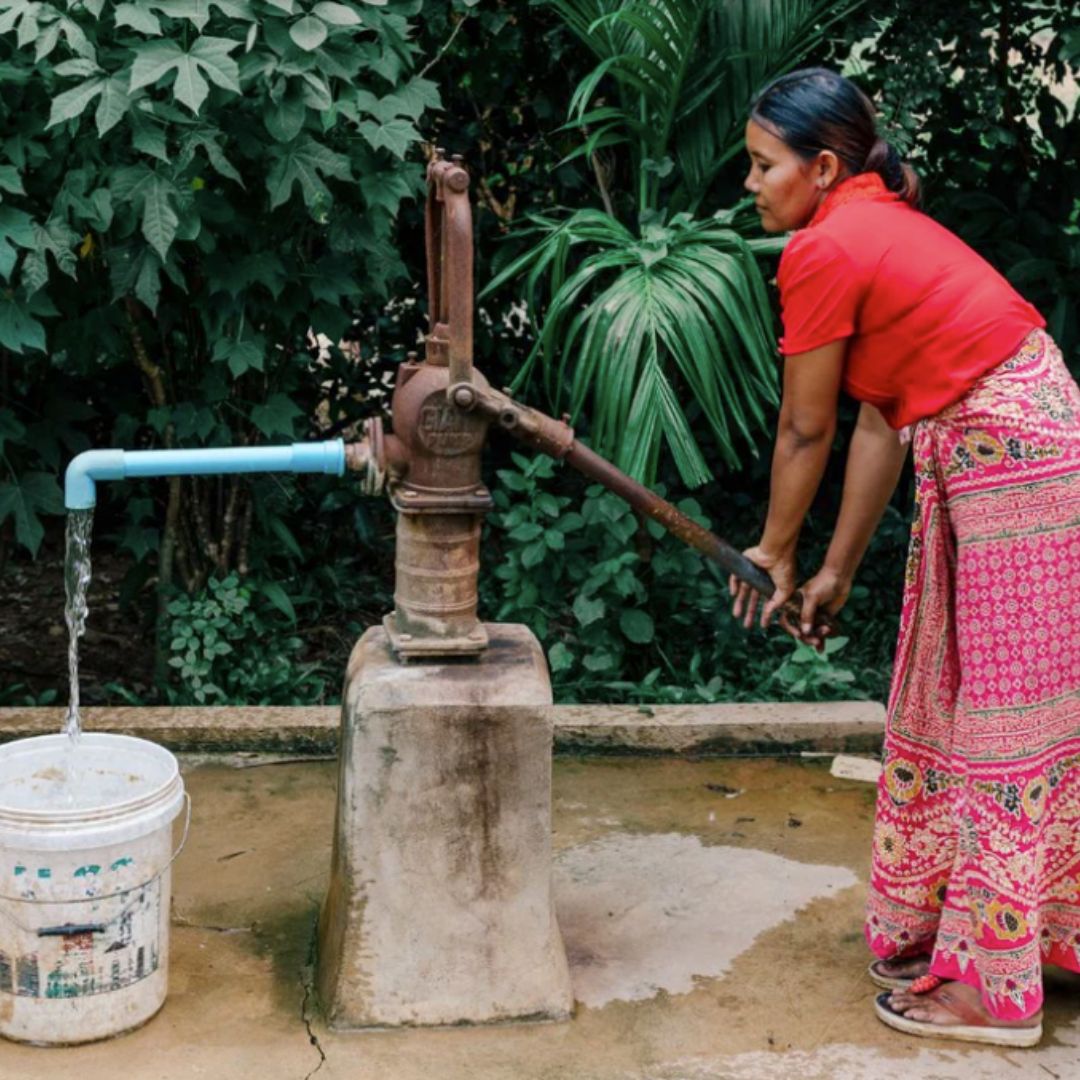Today is World Elephant Day So Read This
For the last ten years, Maya has been enjoying her middle age with long, uninterrupted walks along the Yamuna riverside with her BFF Phookali the elephant, and munching on fresh sugarcane in India's Wildlife SOS Conservation and Care Centre, which is located in the district of Mathura, Uttar Pradesh, about 30 minutes outside of Agra.
Sounds like a life we could all get used to, right?

I recently had the opportunity to meet this magnificent creature and learn about her history, which had a great effect on me. With today being World Elephant Day, my goal of sharing her story is to bring more attention to the plight of elephants across the globe.
Maya's life wasn't always this idyllic. She was rescued from an Indian circus in 2010 where she lived an abusive life of a performing elephant. Often made to stand on her two legs or "dance" at the whip of a stick, Maya spent much of her early life entertaining people. When Maya was brought to Wildlife SOS for lifelong care, she was extremely frail, in pain and displayed stereotypical behavior which showed her stress.
My tour guide at Wildlife SOS explaining Maya's horrific history in the circus.
The life of a performing elephant is an oppressive and horrendous one where the animal is made to perform unnatural tricks for the purpose of entertainment. Maya was chained up in small enclosures for most part of the day, standing endlessly without food or water.
"I have spent hours and hours watching elephants, and come to understand what emotional creatures they are…it's not just a species facing extinction, it's massive individual suffering." – Dr. Jane Goodall
When Maya arrived at the Wildlife SOS Elephant Conservation and Care Centre, she had severely arthritic limbs that needed urgent medical attention. Devoid of love and care, Maya showed immense faith in Wildlife SOS team of veterinarians and her mahout (an elephant "whisperer"} and dedicated care and treatment brought her strength up to a point that she has now recovered from her abusive past.
My tour guide at Wildlife SOS explaining Maya's horrific history in the circus.
 |
 |
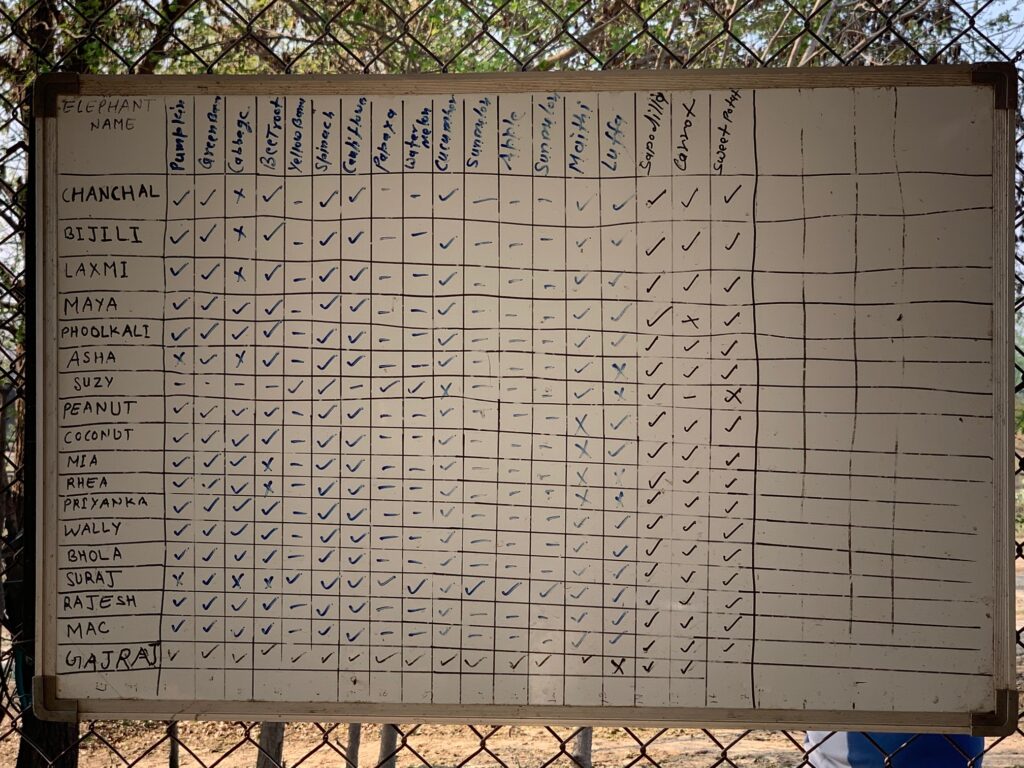 |
 |
 |
 |
Wildlife SOS was established in 1995 to make a lasting change to protect and conserve India's natural heritage, forest and biodiversity. Their team actively works towards protecting Indian wildlife, conserving habitats, studying biodiversity, conducting research and creating alternative and sustainable livelihoods for former communities that depend on wildlife for sustenance.
Facts to know
- Today there are less than 450,000 elephants left in the world (about 40,000 of those are Asian elephants and the rest are African).
- The Asian elephant range has shrunk by more than 70% in the last 50 years, mostly due to the clearance of forests for settlement and agriculture by humans.
- According to WWF, Poachers kill tens of thousands of African elephants each year for their ivory tusks and have irradicated about ¼ of all African elephants in just the last 10 years.
- According to Newsweek, 20,000 African elephants are killed every year, which means they could become extinct by 2040.
- Elephants are the largest land animal on earth and share many human attributes such as crying, laughing, playing, displaying empathy, mourning their dead, having strong maternal instincts and incredible memories, and eating nonstop (maybe that last one relates more to me since this pandemic started.)
- World Elephant Day was created in 2012 by activist Patricia Sims as "a rallying call for people to support organizations that are working to stop the illegal poaching and trade of elephant ivory and other wildlife products, protect wild elephant habitat, and provide sanctuaries and alternative habitats for domestic elephants to live freely."

While poaching numbers have dropped, in part from the declining demand for ivory in China, (the country banned the trade at the end of 2017), there is still so much to do. And now with Covid's effect on the decrease in tourism, which brings in a tremendous amount of revenue to treat, feed and rehabilitate elephants, sanctuaries like Wildlife SOS need our help more than ever.
Actions you can do now to make a difference
- Support conservation efforts with tax-deductible donations to charities such as the Sheldrick Wildlife Trust, Space for Giants and African Wildlife Foundation.
- Adopt an Elephant. No, you don't have to have a big backyard. Donations to World Wildlife Organization or Wildlife SOS can help provide elephants with food, medical care and playful enrichments. Some places even provide you with a picture of your elephant so you can lovingly add it to your wall of family photos.
- Don't buy anything made from ivory, obviously.
- Opt for certified fair-trade coffee (many coffee crops are grown in plantations that were once elephant habitats).
- Stay away from zoos or circuses. Any place you see an elephant being captive for human's entertainment should be boycotted. That includes any place you see the opportunity to ride an elephant for fun. Click here to learn more about the movement #refusetoride.

The Poaching Effects on Baby Elephants
While researching the impact of elephant poaching, I learned from fashion designer and animal activist Dalia MacPhee about the devasting effects it has on baby elephants as well, which are often left to fend for themselves because they haven't yet grown the ivory tusks that poachers are looking to cash in on.
These baby calves no longer have their mothers to provide warmth, making them highly susceptible to pneumonia and death. McPhee recently designed a collection of blankets (and yes they're very fashionable) for orphaned baby elephants (think Thunder Jackets for dogs) with heat insulation and water/rain protection. A portion of these blankets have been donated to the Shannon Elizabeth Foundation to distribute to elephant sanctuaries and rescues in need.

You can help sponsor a baby blanket starting at $10 here.
 |
 |
Brands that Give Back
Elephant Parade is a social enterprise and runs the world's largest art exhibition of decorated elephant statues, all of which have been painted by renowned international designers, artists and celebrities. Each Elephant Parade statue is a unique art piece. The life-size, baby elephant statues are exhibited in international cities and raise awareness for the need of elephant conservation. If you're lucky enough to be in Europe right now, 30 painted elephants are currently on display in the Belgian city of Mons till the beginning of September.
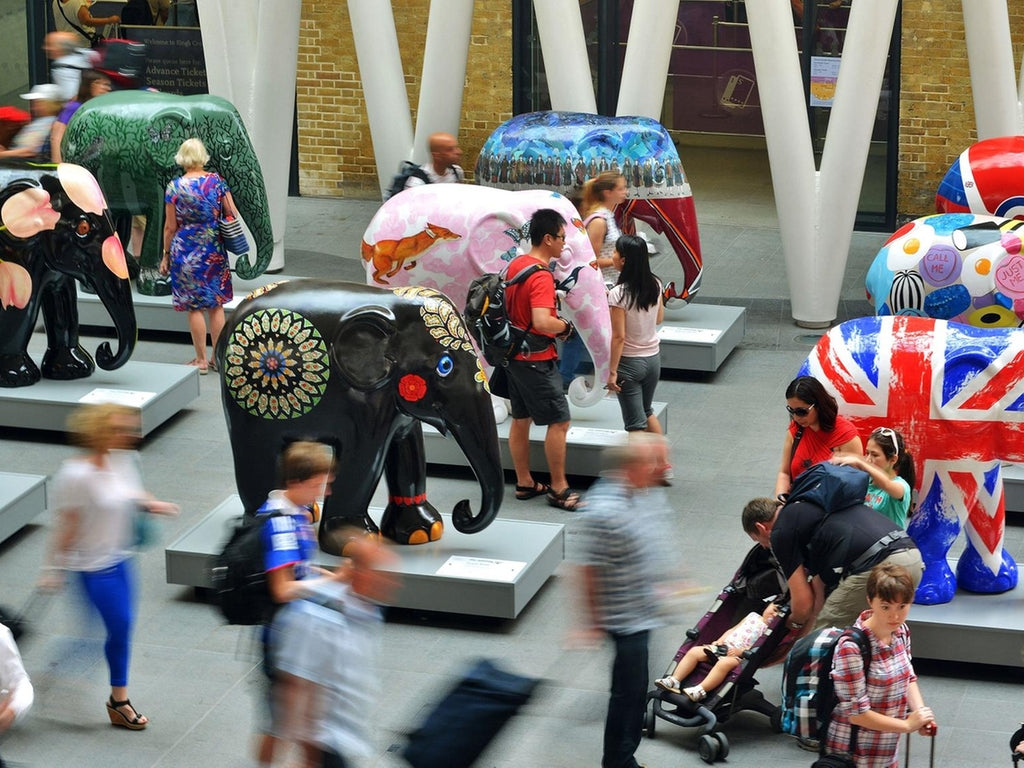
Founded by a father and son team back in 2006 after meeting a baby elephant named Mosha in Thailand who had lost part of her leg after stepping on a landmine, Elephant Parade was their way to create something tangible that would be profitable for the welfare of elephants at the Friends of the Asian Elephant Hospital in the long run.
 |
 |
Elephant Parade founders Mark and Mike Spits and Mosha, the elephant
Limited edition, handcrafted replicas and a select range of products are created from the exhibition elephants. Twenty percent of Elephant Parade net profits are donated to elephant welfare and conservation projects. My favorite is this very giftable Artbox (approx. $52); a blank Elephant Parade replica, five acrylic paints, three brushes and a multilingual instruction booklet to allow you to paint your very one masterpiece.
 |
 |
 |
Elepanta offers the cutest, coziest collection of fair-trade created yoga pants, dresses, kimonos and even face masks all emblazoned with whimsical elephant designs. Launched only last year, this Mexican-based brand donated 10% of all net profits to their partners at Save Elephant Foundation and Save the Elephants who work daily to rescue, protect and care for the elephants in Asia and Africa.
 |
 |
 |
Legend Bracelet was created in 2016 as a means to inspire people to connect with the earth and form a community that fights to protect it. In partnership with Reteti Elephant Sanctuary, Legend created the Elephant Bracelet, an eco-friendly accessory made from sustainably harvested bark from cork trees linked by two vials filled with sand from the African sanctuary. Twelve percent of each bracelet sale helps save orphaned and abandoned elephant calves before releasing them back into wild herds. For World Elephant Week, they're offering 20% off.
 |
 |
Earth & Stone, based out of Australia, donates portion of all the sales from their high quality, handmade shower & bath products, candles and lip balms to the Sheldrick Wildlife Trust in Kenya. Customers can use the coupon code DOLOLO for a 10% discount on all their products. Dololo is the name of their first adopted elephant!
 |
 |
 |
 |
It may sound hokey, but ever since I visited Wildlife SOS in northern India a week before the world went into lockdown for coronavirus, the popular saying, "The earth was made for all beings, not just human beings," resonates with me more now than ever. I'm so grateful that I had the chance to spend time at this awesome wildlife sanctuary and look forward to the day I'll be able to visit again. For now, I hope the goal of World Elephant Day - to spread awareness and education about the downward spiral of these gentle giants - is a wake up call for everyone.
Here are some more photos and stories of the elephants currently being rehabilitated at Wildlife SOS in northern India.
 |
 |
 |
 |
 |
 |
 |
 |
 |
 |
 |
 |
-
Posted in
Elephant rescue, world elephant day











